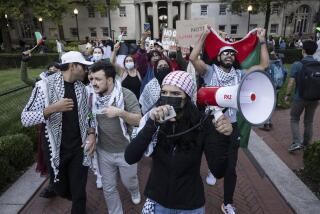PLO Sweeps West Bank Student Vote : Israel: Birzeit University election seen as precursor to polling for Palestinian self-rule in occupied lands.
- Share via
BIRZEIT, Israeli-Occupied West Bank — Supporters of the Palestine Liberation Organization swept student council elections Thursday at Birzeit University, defeating Islamic fundamentalists in a contest viewed as a forerunner to voting that would precede Palestinian self-government on the West Bank and Gaza Strip.
The PLO student ticket won nearly two-thirds of the votes and all nine council seats despite stronger-than-expected support for the Islamic Resistance Movement, which has emerged in the last three years as a major rival to the PLO.
The real PLO victory came, however, in the run-up to the election when the organization’s competing factions--PLO Chairman Yasser Arafat’s mainstream Fatah group and two Marxist offshoots--agreed to campaign together on a unity ticket despite sharp differences in ideology and over negotiations with Israel.
“The situation at Birzeit is like a political mirror for all the occupied territories,” said Fahmi Salim Zaareer, a chemistry student, who was elected on the PLO ticket. “We hope that the election will help the PLO to become as united as we are here at Birzeit.”
Although there were a variety of campus issues, including cafeteria food, student housing and extracurricular activities, the overriding questions were national politics--Palestinian participation in peace negotiations with Israel, establishment of a Palestinian home-rule government, the character of a future Palestinian state.
“The basic question is, who is able to speak for the Palestinian, who is able to solve the Palestinian nation’s problems,” said Samir Nasser Abu Dalhoum, a PLO organizer. “There were different ideologies in competition here, and this was as much a national election as a student vote.”
Walls of the Birzeit campus were covered with pictures of Arafat and George Habash, leader of the Popular Front for the Liberation of Palestine, and campaign literature focused largely on the negotiations with Israel over a transitional period of self-government leading to what the Palestinians hope will be an independent state.
“This election is important in that we see what are the differences between us and the other parties,” Ghada Wehaidi, a member of the PLO ticket, said.
To achieve the unified PLO ticket, Fatah agreed to share council seats with the Popular Front for the Liberation of Palestine and the Democratic Front for the Liberation of Palestine, although they are both avowedly Marxist and, more important, oppose Palestinian participation in the Washington-based peace negotiations with Israel.
“The PLO must always be able to pull itself together to face a challenge,” Yasser Shalaby, one of the PLO candidates, commented. “There are more things that unite our groups than divide them. . . .
In a reflection of the current political balance not only at Birzeit but through the West Bank, the student council will be made up of five Fatah supporters, three backing the Popular Front and one supporter of the Democratic Front. The pro-Communist People’s Party backed the PLO ticket, but declined the position it was offered.
Mocking this as “artificial unity,” Ziad Qasem of the Islamic Resistance Movement said the compromise reflected weakness and lack of principles.
“This was opportunism,” Qasem said. “In contrast, we are based on Islam and its beliefs, and support for us is growing every day.”
The oldest of the still-young Palestinian universities and community colleges, Birzeit draws its 2,400 students from throughout the West Bank and Gaza Strip, making it representative of the Palestinian political elite. It resumed regular classes for the first time in five years this autumn after prolonged closures during the intifada , the Palestinian uprising against Israel’s military occupation.
Testing the increased Israeli tolerance for Palestinian political activity, members of the PLO ticket campaigned openly although, under Israeli military regulations, such public support for the PLO is illegal and punishable by imprisonment.
Candidates for the Islamic Resistance Movement, popularly known as Hamas, or Zeal, from its Arabic initials, and for the Islamic Jihad also publicly identified themselves with their groups. Hamas won about a third of the votes, but the more radical Islamic Jihad got only 40 out of 2,080 cast.
More to Read
Sign up for Essential California
The most important California stories and recommendations in your inbox every morning.
You may occasionally receive promotional content from the Los Angeles Times.













